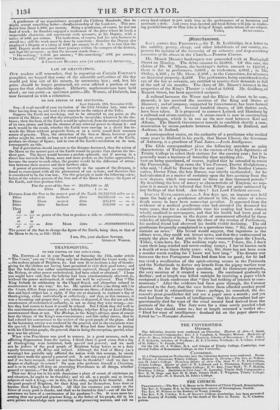THANKSGIVING.
TO THE EDITOR OF THE SPECTATOR.
EDITOR—I see in your Number of Saturday the 17th, under article "The Court," you say " One thing only has distinguished the Court week, viz. —the zealous people of Brighton, &c. had seen fit to institute a day of thanks- giving for the cholera not having been permitted to visit their good town ; and that the holyday was rather sanctimoniously enforced, though no sanction of the Bishop, or other power ecclesiastical, had been asked or obtained." I hope you might have said, that the holyday had been sanctimoniously observed, as, without the power ecclesiastical, it could not well be enforced. That "The King forbade its celebration in the Chapel Royal, and altogether refused to countenance it in any way," &c. &c. My opinion of this (one thing only) in the Court, differs from yours; and my reasons are these—I think every Chris- tian and loyal subject has a right, if they are so disposed, to institute a day of thanksgiving, either individually or collecticely ; and that, in this instance, it was a becoming and proper duty : yet, when so disposed, if they did not ask the countenance of eeelessastical authority, in not so doing they were wrong,—un- less they had reason to know it would be refused. But I think they did well in the sanctimonious observance of such a holydav, whether King or Lord Bishop countenanced them or not. The Bishop, as the King's adviser, must of course bear the blame of the King's non-concurrence; and this rather shows, that he had refused his concurrence to the wishes of the good people of the place. And as the becoming service was rendered by the general, and as the exceptions were the special, I should have thought that the King had done better in joining with his Christian people, the general, than in being the exception, special, who- ever was his adviser.
When wise Providence sees good to remove, in a great measure, such an afflicting dispensation from the nation, I think there is good cause that a day of thanksgiving were instituted, both special and general; and we need not be jealous of the good people of Brighton being before us in a duty equally becoming all, King and subject. Although the God of Mercy (as a warning) has partially only afflicted the nation with this scourge, he surely could have made the special a general evil. Is not this cause of thankfulness: and if we have escaped, shall we not therefore be thankful ? shall we dare to despise or challenge its return ? No man who professes himself a Christian, and is so in truth, will deny an overruling Providence in all things, whether' general or special,—" for He ruleth all." That our King has in his wide dominions a place of resort, of salubrious air and situation, he ought to be thankful ; and we all, as a people and as loving subjects of such a King,—we in this, for his sake, ought to be thankful. And the good people of Brighton, for their King and for themselves, have done as became their King's best friends. All that his creatures can render to the Giver of every good is thanks, and shall we be limited in this ?—cut off the best assurance we have of a continuance of his goodness ?—No. It were more be- coming that our good and gracious King, as the father of his people, did in his .own person acknowledge such preventing and preserving mercies, and call on every loyal subject to join with him in the performance of so becoming and necessary a duty. And every true-hearted and loyal Briton will join in render- ing grateful homage to Him who is King of Kings, and to whom all are subject,



























 Previous page
Previous page